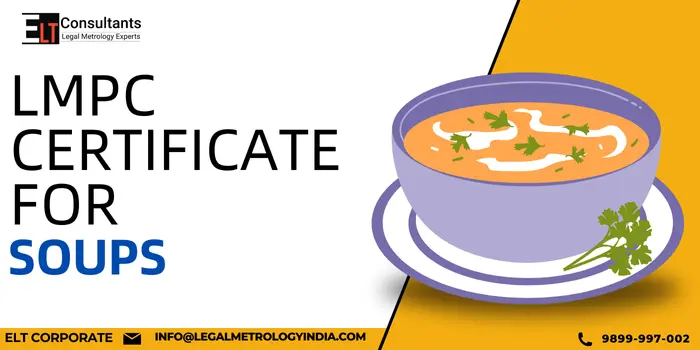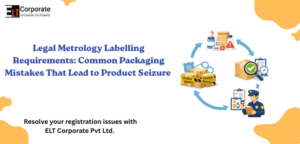Are you searching for the best consultancy to register an LMPC certificate for soups? Then, here is the best regulatory consultancy, ELT Corporate. As you now know, it is essential to get an LMPC certificate because it ensures that you are adhering to legal standards set by authorities. You should know the process to obtain an LMPC Certificate, the documentation required for it, and the consequences that can occur if you fail to comply with the rules.
What is an LMPC Certificate for Soups?
The LMPC Certificate (Legal Metrology Packaged Commodities) is an essential certification issued by the Legal Metrology Department in India. It assures that the soups you produce, package, or import follow legal standards. These standards cover aspects like the right weight, volume, and labelling of the soup products.
Basically, this certificate helps to maintain correct and proper marketing by guaranteeing that consumers receive accurately measured products. This license is not just restricted to soups; however, for this blog, we will concentrate on the soup industry.
Why Do You Need an LMPC Certificate for Soups?
It could be clearer why we need the LMPC certificate for soups and what consequences will occur. The LMPC certificate is a legal requirement for all business owners involved in the sale, packaging, or import of packaged commodities, including soups.
Legal Compliance – With the LMPC Certificate, selling soups in India or importing them into the country is legal. You might face legal troubles and huge amount fines.
Consumer Protection – This LMPC certificate shows that your company follow the rules. It makes products with proper quality, guaranteeing that customers are aware of the right weight, ingredients, and other required information.
Avoids Penalties – If you operate the business without registering for an LMPC certificate, then this will lead to significant legal consequences. By having an LMPC certificate, you ensure that your business cooperates with packaging and labelling regulations.
Who Needs an LMPC Certificate for Soups?
Typically, an LMPC certificate is required by distributors, retailers, manufacturers, and importers. To know more details, please check the information given below:-
- Distributors/Retailers – If you are not involved in the manufacturing or importing of soups, you still have to ensure that every product you are marketing has a secure LMPC Certificate.
- Importers – If you are planning to import soups into India, then you have to obtain an LMPC certificate because only with that certificate can you legally import the product.
- Manufacturer – If you manufacture soups, then it doesn’t matter whether about local or international sales; you must have an LMPC license to make sure that your products stand on the legal standards set by the government.
How Long Does it Take to Get an LMPC Certificate for Soups?
To obtain the time LMPC certificate for soups usually takes up to 2 to 4 weeks. It would help if you remembered to take care of document accuracy because you need to submit the proper documents to ensure the process is completed on time. Make sure about the processing time, as it will vary based on the load on the legal metrology department.
What are the Benefits of Having an LMPC Certificate for Soups?
Generally, an LMPC Certificate for soups has many benefits for your brand and its reputation. However, we are here with some of the essential benefits it offers, and all are mentioned below:-
- Legal Compliance – Securing the LMPC certificate represents that your company item “Soup” meets all the legal standards for packaging and labelling, which helps in avoiding colossal numbers of penalties or any legal actions that can occur against your company.
- Consumer Trust – Having an LMPC certificate allows customers to trust your product without any wrong thoughts about the quality and hence builds the brand’s credibility.
- Avoids Business Disruption – operating a company without an LMPC certificate could cause many adverse outcomes like legal disputes or bans on the brand.
How Can you Renew the LMPC Certificate for Soups?
After you have gotten the LMPC (Legal Metrology Packaged Commodities) certificate for soups, you have to remember the date of their expiry so you will remember to renew the license. Basically, you have to renew the license periodically to ensure compliance with legal standards. Here are the points you should remember while renewing the LMPC certificate for Soup:-
- Rember to monitor the expiry date of the license
- Submit & renew the application before its expiry
- In the end, pay the required amount for the renewal.
Conclusion
Obtaining an LMPC certificate for Soups is really important to run the business smoothly. It is an essential part of operating any business legally importing, manufacturing, or distributing. By understanding what an LMPC certificate is and how to maintain it, you can ensure that your soups meet all the crucial packaging and labelling standards. So, I need to know all the details about the Registration for the LMPC Certificate.
What is the LMPC Full Form?
LMPC stands for” Legal Metrology Packaged Commodities” It is essential to ensure that pre-packaged commodities comply with the legal standards set by the Indian legal metrology department.
What if You Don’t Need an LMPC certificate for Soup?
Handling a company without an LMPC Certificate can result in negative results like penalties and fines.
Do Importers of Soups Need an LMPC Certificate?
Yes, If you are dealing with pre-packaged commodities then you must obtain the LMPC certificate. So, if you are an importer of packaged soup then must apply for the license now.
Can small businesses selling soups online skip the LMPC certification process?
No, even small businesses selling soups online are required to comply with LMPC regulations. All pre-packaged soup products must be certified, regardless of the scale or the platform through which they are sold, ensuring that consumer rights are protected.








